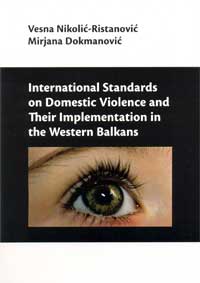
|
||||||||||

|
|
|||||||||
"This report is the result of the project "Support for women's human rights in the Western Balkans". It was implemented by Humanistisch Overleg Mensenrechten - HOM (Humanist Committee on Human Rights), an NGO from the Netherlands, and NGOs from the following Western Balkan countries: Albania, Bosnia and Herzegovina, Croatia, Macedonia and Serbia and Montenegro. " |
||||||||||
"Violence against women is perhaps the most shameful human rights violation. It knows no boundaries of geography, culture or wealth. As long as it continues, we cannot claim to be making real progress toward equality, development and peace." Kofi Annan, United Nations Secretary-General |
||||||||||
"Today, the protection of human rights, especially protection against violence, has become a major issue at the global and national levels. Virtually all topics discussed at various forums are linked with basic human rights and freedoms. This issue is emphatically present during the formulation and implementation of policies aimed at combating violence and eliminating various kinds of discrimination. When violence is discussed, this usually concerns street violence and armed conflicts. However, the most widespread form of violence remains largely invisible and is not adequately addressed by states, even though it occurs in all societies. This is the violence of men against women in the private sphere - in homes and in intimate relationships far away from the eyes of the public. Due to its prevalence, violence against women is a major human rights concern. Aggression in the private realm is just one form of violence suffered by women, but it occurs in all countries and all social classes. In every country where reliable, large-scale studies are available, between 10% and 50% of women report having been physically abused by an intimate partner during their lifetimes. Population-based studies indicate that between 12 % and 25% of women have experienced either attempted or completed acts of forced sex by an intimate partner or ex-partner. In 1998, interpersonal violence was the tenth leading cause of death for women between the ages of 15 and 44. Of all violent crimes reported in Europe, 25% involve a man assaulting his wife or partner. These data from recent reports of the World Health Organization1 and the European Parliament illustrate the magnitude of this problem. Reliable research indicates that violence against women, particularly in the private sphere, menaces the physical and mental integrity and lives of millions of women and girls every day, regardless of where they live. Most studies on violence against women show that the perpetrators of violence against women are almost exclusively men; that women are at greatest risk of violence from men they know; and that women and girls are the most frequent victims of violence within the family and between intimate partners." "This report consists of five chapters. The first chapter makes introductory remarks and introduces the material on which the report was based. It also provides background information on the countries included in the research. The second chapter introduces the information we have regarding the factual situation and the prevalence of domestic violence in the participating countries. The third chapter provides a brief summary of the relevant international law: what are international standards, where can we find them, and what are states expected to do? The work of the UN, the Council of Europe and the European Union in combating domestic violence is summarized, along with the international standards in this field. In the fourth chapter we determine if those standards have been correctly implemented in the participating countries, and we discuss the research. The main research question was, do the governments comply with the international standards in this field? In the final chapter we present the remarkable findings of the study concerning the role of non-governmental organizations (NGOs) in the participating countries regarding the protection of women and the prevention of domestic violence, and we advocate improved implementation of the international standards. The report ends with an evaluation of the level of implementation of these standards by the governments in the region and in what respects they should improve their laws and policies." |
||||||||||
|
Mirjana Dokmanović |
||||||||||
| |
||||||||||

|

|

|
 |
  |

|
.jpg)
|
Reforme Evropske Unije |
.jpg)
|
| Umetnost vođenja ljubavi |
.jpg)
|
| Nikola Tesla |
Copyright © IGP Prometej Beograd 2006-2022


